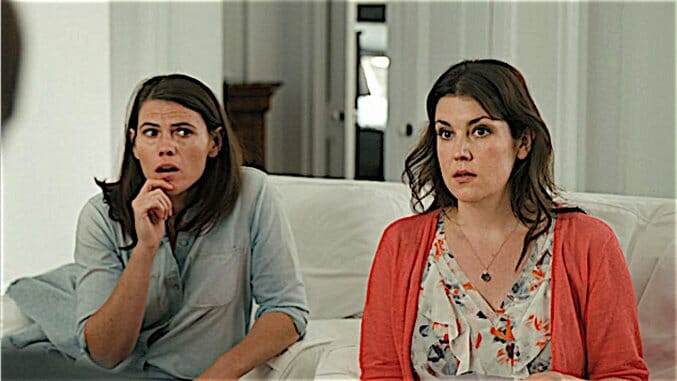Clea DuVall talks The Intervention

The digital revolution hasn’t just empowered people outside the film community to begin making their own films; it’s empowered actors as well, may of whom were shut out of the process for years. One of the latest actors to make a foray into the world of feature directing is Clea DuVall, probably best known for roles in HBO’s short-lived but much-beloved series Carnivàle and in the Oscar-winning film Argo (among many others). Her directorial debut, The Intervention, premiered at Sundance this year and boasts a long list of indie favorites in the cast, including Melanie Lynskey (who won a Sundance acting award for the film), Jason Ritter, Natasha Lyonne, Cobie Smulders, Alia Shawkat, and others. After a successful theatrical run, the DVD is out this month from Paramount Home Video. Duvall joined us recently to discuss the film.
Paste Magazine: So, it’s been quite a path for you from Sundance to this point. I’m sure it’s been an emotional rollercoaster going from making the film, to premiering the film, to finally releasing it. So why not start from the end instead of the beginning and tell me how it feels to get to this point?
Clea DuVall: It feels very surreal—almost like it didn’t happen. I mean, I got a package in the mail the other day, and it was of five DVDs of the movie. I had a DVD in my hand, and I was looking at it, and I just couldn’t believe that on that disc was a movie that I’d made, just based on this idea that I had, sitting alone in my apartment. It was just so bizarre. But I feel so grateful that I got to have that experience, and now I really want to do it again.
Paste: When I first got mine, the first thing I wanted was to send one to my parents. To say, “Look! This is the thing!” (Both laugh) Yeah. So, now let’s go all the way back to the beginning. Let’s talk about sitting in that room and having an idea, and especially for someone who is a veteran actor. Tell me about the idea of getting around on the other side of the camera.
DuVall: Well, directing was something that I wanted to do when I was in, you know, in my 20s. I said that I wanted to make a movie before I turned 30 and then—it’s the craziest thing, if you don’t do anything to make that happen, it won’t happen. (they laugh) There was no magical package that arrived with a movie for me to direct. I think I was really intimidated by that idea. And then I got to a place where I was looking around and I was seeing so many people who I knew and loved who were just doing it. Who were writing their own scripts and producing their own movies, directing their own movies, and I felt so inspired by that, and it made me want to give it a try. So I wrote this script. I thought, “Okay, what story can I tell that we could make for no money?” I just had this idea and started writing it, and wrote myself a part—I thought that I didn’t want to direct it and then got to the place where I realized that I was just being scared, and I should just go for it. Sx months later, we got financing and three months later we were shooting.
Paste: Any specific people that you want to call out for being especially inspirational to you as far as writing and making their own movies?
DuVall: Well, I love Lake Bell’s movie and think she’s so fun and talented, she’s so focused and so strong. She was someone who I really looked at and felt extremely inspired by, and I’m still inspired by.
Paste: Yeah, she’s pretty amazing. Tell me about assembling this fantastic cast. I know you and Mel have been friends for a long time, right?
DuVall: Yes, yes, yes. I wrote it for Melanie. She was my muse, and then Alia Shawkat came on, and Natasha and Jason, they’re all friends of mine. And then Cobie, Vincent and the rest came on through other connections with the representatives of the actors that we already had.
-

-

-

-

-

-

-

-

-

-

-

-

-

-

-

-

-

-

-

-

-

-

-

-

-

-

-

-

-

-

-

-

-

-

-

-

-

-

-

-








































